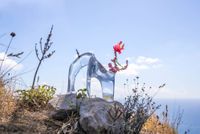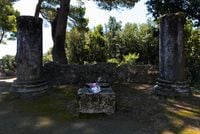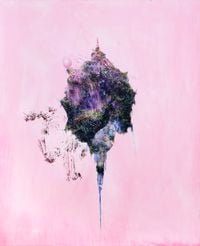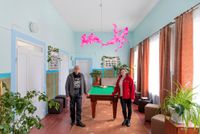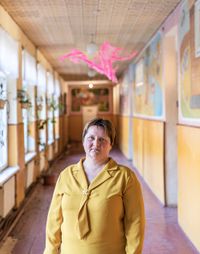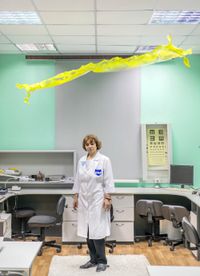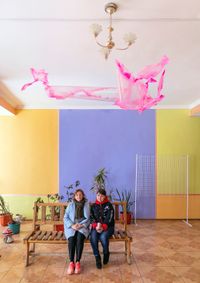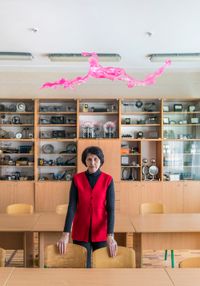In his drawings, sculptures, and installations, Aljoscha addresses topics such as biology and the theory of life, as well as bioism, which serves as a utopian model for new forms of life or living beings, but also with the great philosophical and scientific questions about life itself. He says: 'I regard art as one of the highest human activities. For me, it represents a philosophy, perhaps even a religion. In this sense, I try to create an aesthetic utopia.'1
Read MoreHis filigree, futuristic-looking acrylic objects and installations made of pigmented acrylic glass have both a sculptural and painterly quality. Drawing and painting play an essential role at the beginning of his artistic process. His experiments with painting and coluor are the starting point for his three-dimensional works. The material's transparency and fragility and the form's ephemeral nature have been deliberately chosen as their floating state evokes mobility and dynamism. Inspired by the organic form of our microcosm, the artist, who is at the same time a scientist, works to create new connections rooted in infinity, indescribability, and unfamiliarity. He is just as interested in the inner appearance, which radiates 'bio-futuristic sublimity and bliss', as he is in the outer one, whereby the seemingly arbitrary stringing together of individual sculptures turns a larger whole into an organism.
The small sculptures—seemingly biological or organic objects—at times recall the filigree structure of corals, an aesthetic that can only be found in nature. Aljoscha creates new worlds with his unique formal language, while raising questions about the individual, their freedom, and broader social processes from a bio-ethical perspective.
The exhibition title 'peak experience' is a logical continuation of the themes of the installation A Biology of Happiness, which was realised at the Kunstraum Dornbirn in 2017. This term comes from biological studies of human emotions and unique life experiences, where euphoria and exuberance, eudaimonia and joie de vivre, as well as idealism, play a central role. These terms are all linked with bio-futuristic visual experiences in an aesthetic sense.
Aljoscha, born 1974 as Aleksey Alekseevich Potupin in Glukhov, Ukraine, was a guest student at the Kunstakademie Düsseldorf with Prof. Konrad Klapheck from 2001 to 2002 and studied with Shirin Neshat at the Internationale Sommerakademie für Bildende Kunst Salzburg in 2006. In 2008 he received the 1st prize in sculpture at the XXXV. Premio Bancaja, Valencia, Spain and in 2009 the sculpture prize 'Schlosspark 2009' in Cologne. In 2010, he realised the installation project bioism uprooting populus, which was sponsored by the Karin Abt-Straubinger Stiftung in Stuttgart. In November 2018, Aljosha represented the Ukraine in the 1914/1918 - Not Then, Not Now, Not Ever at the German Bundestag, which commemorated the 100th anniversary of the end of World War I. His works are represented in numerous private collections and museums, including the Erarta Museum of Contemporary Art in St. Petersburg, the Kupferstichkabinett Berlin, and the State Museum of Contemporary Art in Thessaloniki.
The artist has lived and worked in Düsseldorf since 2003.
1 http://salve-magazine.de/aljoscha/
Text courtesy Beck & Eggeling International Fine Art.
